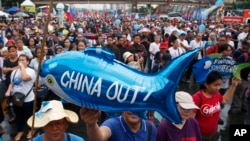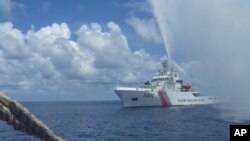A new public opinion study has found that Philippine trust in China has dropped over the past year.
The study, carried out by Manila-based Social Weather Stations, found that 51 percent of people questioned felt “little trust” in China. Just 27 percent said they placed “much trust” in China. The drop in trust levels brought them down to the lowest point since June 2018, the research company reported.
The company’s research has historically been considered a good measure of current public opinion in the Philippines.
The drop in trust comes after a year in which hundreds of Chinese ships passed near Philippine-held islands in the Spratly chain in the South China Sea. In early June, a Chinese fishing boat hit and sank a Philippine boat near the disputed sea’s Recto Bank.
Eduardo Araral is a professor at the National University of Singapore’s public policy school. He told VOA that such incidents always draw wide media coverage in a way that “is probably not good for the relationship with China.”
Disputes in the South China Sea have caused tensions in Philippine-Chinese ties. In 2016, an international court ruled in favor of the Philippines in a case challenging China's historical claims to large areas of the sea. China rejects the ruling.
But under Philippine President Rodrigo Duterte, ties with China began warming and he sought increased investments. Philippine officials have said China has so far offered at least $4.7 billion for infrastructure projects in the Philippines.
Some economic experts say some Filipinos believe China is gaining too much influence over businesses in the country. Chinese or Chinese-Filipino citizens run most Philippine-based businesses today, the advisory company China Philippines United Enterprises reports.
Of those questioned for the public opinion study, only 27 percent said most of what the Chinese government wants in the Philippines is “good for the Filipinos.”
VOA spoke to some citizens from Luzon, the Philippines’ largest island, to get their opinions on trust issues related to China. Some of those questioned said they had little knowledge about the issues. Others said they worried about China’s moves against Philippine territorial claims in the South China Sea.
Rhona Canoy is president of an international school in the southern Philippines. "The Chinese being here goes beyond just the maritime border and area dispute," Canoy said. "A lot of that which is more directly impacting our people is the fact that they are the ones who are opening businesses."
Santy Mallorca is a 50-year-old motorbike driver. He said he thinks China represents a threat to the government’s claims in the South China Sea. “Because so many people get money from fishing…accidents, you know,” he said.
About 2 million Filipinos depend on fishing for a living.
Winston Sayson is a 41-year-old who spoke to VOA while waiting for a flight at the airport in Manila. He said China had so far shown no clear signs of attempting to remove the Philippines from the disputed sea. So, he said, he does not worry about it.
I’m Bryan Lynn.
Ralph Jennings reported this story for VOA News. Bryan Lynn adapted the report for VOA Learning English. Ashley Thompson was the editor.
We want to hear from you. Write to us in the Comments section, and visit our Facebook page.
________________________________________________________________
Words in This Story
chain – n. a series of something
challenge v. express disagreement with ideas, rules or someone's authority
infrastructure – n. the basic equipment and structures (such as roads and bridges) needed for an area to operate
maritime – adj. related to ships and sea travel
impact – v. to affect something or someone
We want to hear from you. Write to us in the Comments section, and visit our Facebook page.










